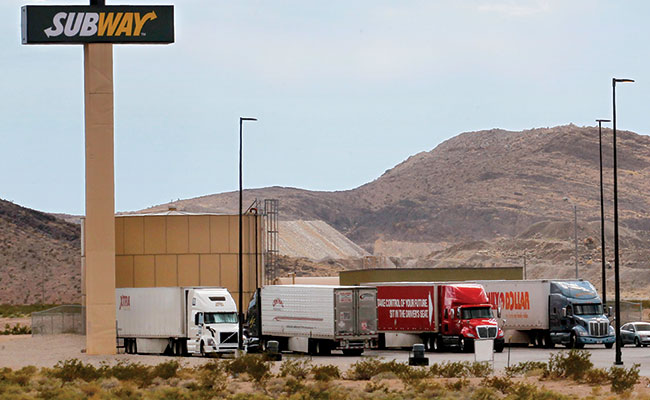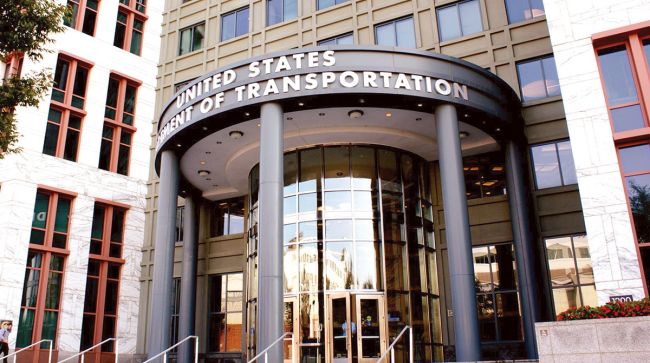FMCSA’s pre-emption decision was upheld in January 2021 by the 9th U.S. Circuit Court of Appeals, supporting the 2018 determination involving California. (Department of Transportation)
The Federal Motor Carrier Safety Administration has announced it will accept petitions for waivers from its 2018 and 2020 decisions to pre-empt truck driver meal and rest break law requirements in California and Washington state.
The California law requires employers to provide a “duty-free” 30-minute meal break for employees who work more than five hours a day, as well as a second duty-free, 30-minute meal break for those who work more than 10 hours a day, and additional 10-minute rest periods every four hours.
By contrast, federal law states that except for certain shorthaul drivers, a property-carrying commercial motor vehicle driver working more than eight hours must take at least one 30-minute break during the first eight hours, although the driver has flexibility as to when the break occurs.
FMCSA first ruled on the issue in 2018, proclaiming that the California law could not be enforced nationwide, and again in 2020 that it could not be enforced in Washington state.

Spear
The 2018 pre-emption FMCSA ruling was issued in response to petitions filed by American Trucking Associations and the Specialized Carriers and Rigging Association. The agency determined that California’s MRB rules, as applied to property-carrying CMV truck and bus drivers subject to FMCSA’s hours-of-service regulations, are pre-empted under federal law.
In a statement in response to the FMCSA announcement, ATA President Chris Spear said the federation is “fully prepared to oppose” the FMCSA’s waiver effort.
“Ensuring a singular, national standard of work rules for professional drivers is crucial to both safety and the supply chain,” Spear said. “ … Federal law already mandates rest breaks for drivers. Unnecessary and duplicative state laws are not grounded in safety and have been primarily enforced via private lawsuits designed to extort the trucking industry. Opening the door to this spurious litigation once again would impair the safe and efficient movement of interstate goods.”
The agency’s pre-emption decision was upheld in January 2021 by the 9th U.S. Circuit Court of Appeals, supporting the 2018 determination that interstate motor carriers are exempt from California’s stringent meal-and-rest-break rules, a decision that supporters have said will avoid a future state-by-state patchwork of rest break rules.

Trucks are parked at a travel stop in Arizona. Supporters of FMCSA’s pre-emption ruling say it will avoid a future state-by-state patchwork of rest break rules. (John Sommers II for Transport Topics)
“The FMCSA reached this conclusion because California required more breaks, more often and with less flexibility as to timing,” the court’s three-judge panel said in its opinion.
Besides the Teamsters union, the challengers in the 9th Circuit case included the California Labor Commissioner’s Office and several individual drivers.
FMCSA has not responded to a question seeking the agency’s reason for now accepting petition challenges to the exemption ruling.
However, now the FMCSA notice says that it is allowing petitions seeking to challenge the exemption decision.
“While petitions for waiver may be submitted at any time, FMCSA requests that any petitions for waiver of the referenced pre-emption determinations be submitted by November 13, 2023,” the agency said in a pre-publication notice Aug. 11.

Host Michael Freeze clarifies the differences between predictive and preventive maintenance. He gives fresh commentary on everything from how enhanced connectivity boosts your preventive maintenance plans to what predictive possibilities AI can offer your shop. Tune in above or by going to RoadSigns.ttnews.com.
“FMCSA will publish any petitions for waiver that it receives and will provide an opportunity for public comment with respect to the petitions,” the agency said.
According to the notice, FMCSA said that meal-and-rest-break laws have no safety benefits that extend beyond those provided by the Motor Carrier Safety Regulations, and are incompatible with federal hours-of-service rules, and place an “unreasonable burden” on interstate commerce.
FMCSA’s action in Washington state came nearly two years after the agency in 2018 determined federal rest-break laws pre-empt California’s separate meal-and-rest-break requirements.
The Agency requested that any waiver petition address the following issues, in addition to any other relevant issues:
• Whether and to what extent enforcement of a state’s meal and rest break laws with respect to intrastate property-carrying and passenger-carrying CMV drivers has impacted the health and safety of drivers.
• Whether enforcement of state meal and rest break laws as applied to interstate property-carrying or passenger-carrying CMV drivers will exacerbate the existing truck parking shortages and result in more trucks parking on the side of the road, whether any such effect will burden interstate commerce or create additional dangers to drivers and the public and whether the applicant intends to take any actions to mitigate or address any such effect.
• Whether enforcement of a state’s meal and rest break laws as applied to interstate property-carrying or passenger-carrying CMV drivers will dissuade carriers from operating in that state, whether any such effect will weaken the resiliency of the national supply chain, and whether the applicant intends to take any actions to mitigate or address any such effect.
“The FMCSA’s notice is particularly troubling as it appears to invite the states to opine that the nonenforcement of the meal-and-rest-break laws have been detrimental to driver health and safety,” said a statement issued by transportation law firm of Scopelitis, Garvin, Light, Hanson and Feary, P.C. “Any such opinion would be directly contrary to the FMCSA’s prior determination that those laws did not provide any additional safety benefit over those provided by the hours of service regulations.”






